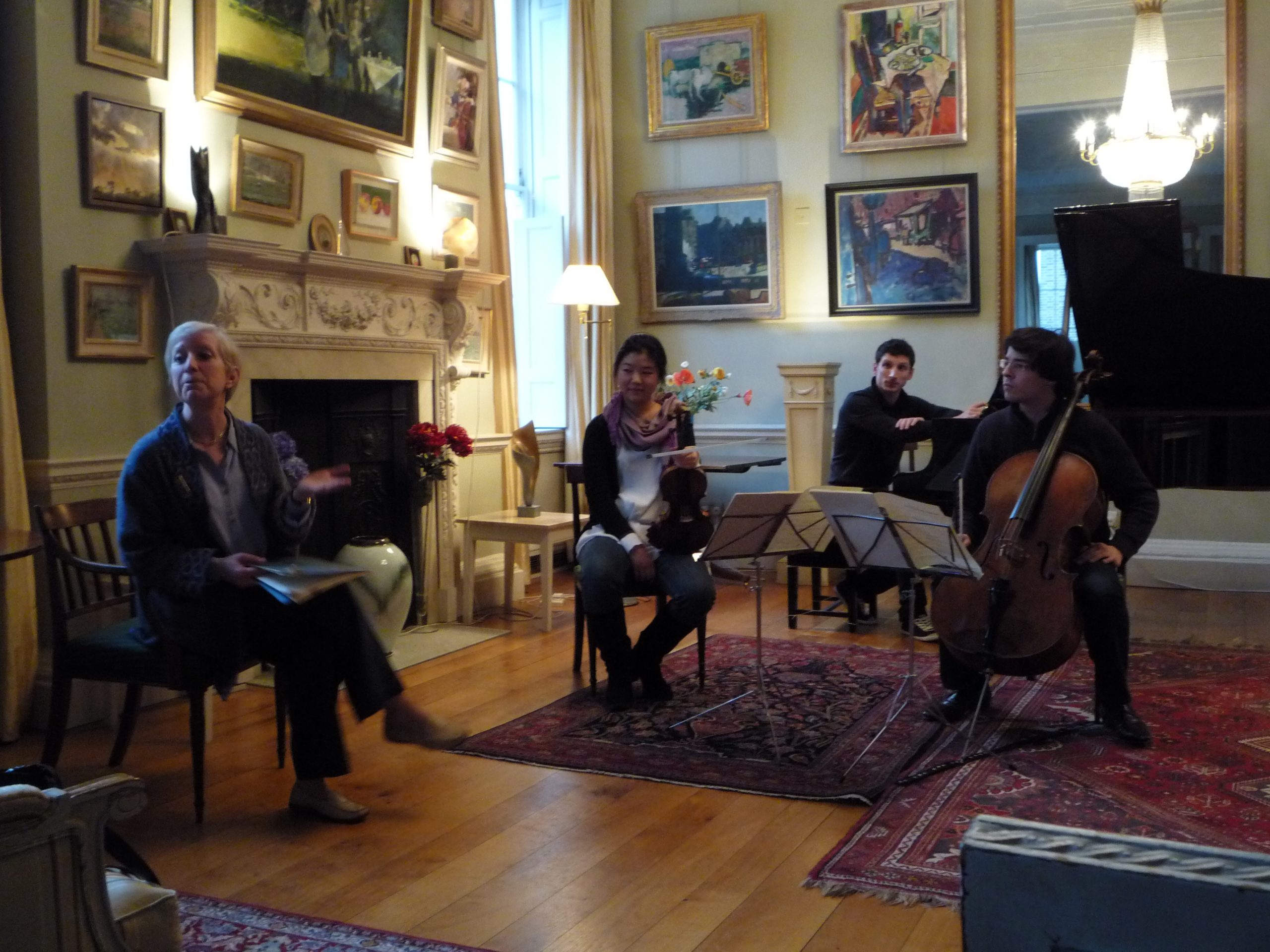 Here I am working with the Trio Paul Klee, from Paris, at my London masterclasses last weekend (I was pointing something out to the audience at the moment the photo was taken). I thoroughly enjoyed working with the eleven young professionals (three trios and a duo) who took part in the two days of classes.
Here I am working with the Trio Paul Klee, from Paris, at my London masterclasses last weekend (I was pointing something out to the audience at the moment the photo was taken). I thoroughly enjoyed working with the eleven young professionals (three trios and a duo) who took part in the two days of classes.
I particularly admired how open they were to trying out new ideas. Sometimes people don’t (or can’t) really try out new suggestions – for a variety of reasons: they don’t want to look silly, they may not have enough technical flexibility to try something new on the spur of the moment, or they’re too heavily invested in doing something the way they planned.
Sometimes people try out your idea for a few bars and then revert. At other times they subtly sabotage the idea, by doing it half-heartedly and making it look unconvincing. It takes a certain largeness of mind to be willing to try out new ideas in front of an audience, and my participants all had it. In the case of the Trio Paul Klee, they took on board the idea of using less vibrato in Mendelssohn’s D minor trio, and they even persisted with the idea and made a success of it in the final concert – quite a tribute to their open-mindedness, I thought.




This ‘openness’ is a rare thing in pupils – often you can wait a whole decade for the protective glass wall to come down and for the leap of faith that facilitates total immersion in an idea. For a ‘weekly’ teacher the important thing is to realise how stressful envisaging in this immersion can seem appear, and to just ‘hang on in there’ until the glass wall drops away. It’s much harder to achieve this in a master class – so your experience with the Klee trio is a real tribute to the atmosphere you created for them. What you may never know is if the ensembles who didn’t appear to try your ideas
fully in public will neverthless have absorbed them in some way and may try some for themselves in private. It seems as though one of the issues here is that the students who put themselves forward for master classes to tick boxes are often doing so with no intention of dropping their guard in public. This ‘never admitting you haven’t already achieved perfection’ attitude is something thing I
have heard British friends finding a problem in business settings in the US. What a shame if globalisation has brought it here. When I was studying with the late great Frederick Riddle, he used to tell his students ‘Always commit fully to your teachers’ ideas while you are studying with them. If you don’t, you may have entirely missed the point. Afterwards,when you have left them, you can pursue your own ideas, but there is no point being with a teacher unless you are prepared to listen carefully, and to try out suggestions.’
I have recently participated in 2 chamber music master classes as a guest and was thoroughly impressed by both. The first was given by Rainer Schmidt of the Hagen Quartet and the second by Valentin Erben, who co-founded the Alban Berg Quartet. The ‘customers’ were young string quartets and piano trios, with some piano + string duets, and some of whom are already on the concert circuit. The master classes were held in Paris but attended by formations from a wide spectrum of countries.
I didn’t at all get the feeling the participants were box-ticking. There was an atmosphere of great enthusiasm and some astonishing exchanges took place. The teaching was in both cases exceptional and worked well because the students were both in awe of their teachers and wanting to get as much as they could from the experience. Thus it was possible for Rainer Schmidt to congratulate a young British quartet on their remarkable rhythmic ensemble, while at the same time getting them to understand that the pulse wasn’t coming from the right place. He said that they were always listening to the instrument that ‘was doing the most’ and not listening enough to the inner pulsation coming from long notes played on the ‘cello. The musicians were working on Schubert’s ‘Death and the Maiden’ quartet and he also made a big point about the quality of silence, explaining that there exist different kinds of silence in music, and especially referring to the end of the second movement, where “any sound, even music, would be vulgar”. The ensuing analysis and performance of the music was a testament to the teacher’s brilliance and the students’ openness and self-questioning. This was everything a master class should be.
Perhaps the fact that the master classes were given, except for one 2 hour session, without the presence of the public, contributed.
Susan — Do you think people in Mendelssohn’s time would have used vibrato less so than is usual today?
Yes. As far as I know, constant vibrato is a relatively recent fashion in string playing. Brahms’s violinist friend Joseph Joachim advocated the use of vibrato as an occasional ‘intensifier’ of a special note or phrase. I believe his final words were to remind a young violinist not to use too much vibrato! Much more recently, Sandor Vegh used to criticise constant vibrato as ‘like pouring a sauce over everything – making everything taste the same’.